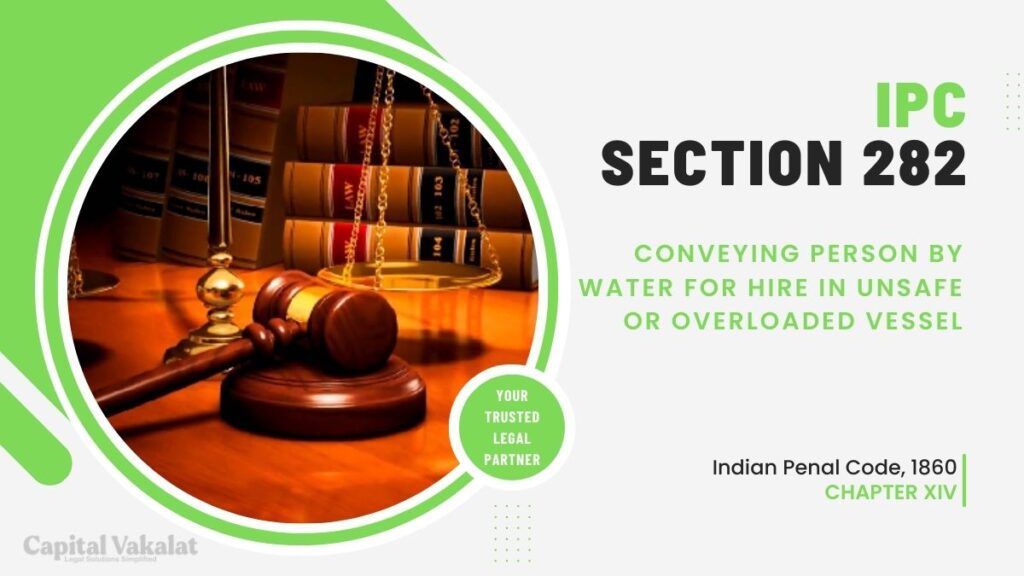Section 282 of the Indian Penal Code (IPC) addresses the issue of conveying a person by water for hire in an unsafe or overloaded vessel. This law is essential for ensuring the safety of passengers and the proper regulation of water transportation.

In this comprehensive article, we will explore the details of Section 282 IPC, its implications, and the significance of adhering to this law.
Introduction to Section 282 IPC
Water transportation plays a vital role in many regions of India, especially in coastal areas and riverine regions. Section 282 of the IPC is designed to ensure the safety of passengers and to regulate the water transportation industry effectively. This section is aimed at preventing accidents and mishaps that may occur due to the operation of unsafe or overloaded vessels.
Understanding the Legal Terminology
To understand Section 282 IPC better, let’s look at some key terms and definitions used in this provision:
- Person: This term refers to any individual who is being transported in a vessel for hire.
- Unsafe or Overloaded Vessel: A vessel that is not in a seaworthy condition or one that carries more passengers or cargo than it is designed for.
Prohibited Acts under Section 282 IPC
Section 282 IPC clearly states that it is illegal to convey a person by water for hire in an unsafe or overloaded vessel. This prohibition is in place to protect the lives and safety of passengers, as overloading and unsafe conditions can lead to catastrophic accidents.
Legal Consequences and Penalties
The violation of Section 282 IPC can have severe legal consequences. Those found guilty of conveying a person in an unsafe or overloaded vessel can face fines, imprisonment, or both. The exact penalties may vary depending on the severity of the violation and its impact.
Importance of Safety in Water Transportation
Safety in water transportation is of utmost importance. Vessels should be in good condition, well-maintained, and not overloaded to ensure the safety of passengers. Neglecting these factors can result in accidents and tragedies.
Enforcement and Monitoring
To enforce Section 282 IPC effectively, authorities monitor water transportation systems. Regular inspections and checks are conducted to ensure that vessels are in compliance with safety regulations. Violators are dealt with strictly to deter others from compromising safety.
Case Studies
Let’s look at a few real-life examples of Section 282 IPC violations to understand the implications better:
Case 1: Overloaded Ferry
In 2017, a ferry in a coastal region of India capsized, leading to the loss of several lives. Investigations revealed that the vessel was carrying far more passengers than its capacity, a clear violation of Section 282 IPC.
Case 2: Unsafe Tourist Boat
A tourist boat operating on a picturesque river was found to have significant safety issues. It lacked life-saving equipment, and its engine was poorly maintained. The owner of the boat faced legal action under Section 282 IPC.
Public Awareness and Education
Raising awareness about the importance of safety in water transportation is crucial. Passengers should be educated about their rights and the conditions they should look for when boarding a vessel for hire. This awareness can go a long way in preventing violations.
Recommendations for Safe Water Transportation
To avoid violating Section 282 IPC, operators of water vessels should take the following measures:
- Regular maintenance and inspection of vessels.
- Adherence to weight and passenger capacity limits.
- Providing life-saving equipment on board.
- Conducting safety drills and exercises for the crew.
- Compliance with all safety regulations.
Conclusion
Section 282 IPC is a critical legal provision that safeguards the lives and well-being of individuals using water transportation services. Violating this law can have severe legal consequences, and it is essential for both operators and passengers to be aware of and adhere to its guidelines.
By prioritizing safety, maintaining vessels properly, and raising awareness, we can ensure that water transportation remains a reliable and secure mode of travel in India.
Frequently Asked Questions
What are the penalties for violating Section 282 IPC?
Penalties for violating this section can include fines, imprisonment, or both, depending on the severity of the violation.
Why is public awareness crucial in preventing Section 282 IPC violations?
Public awareness ensures that passengers are informed about their rights and can make informed decisions when using water transportation services.
How can vessel operators ensure compliance with Section 282 IPC?
Operators can ensure compliance by maintaining vessels, following weight and passenger capacity limits, providing safety equipment, and conducting safety drills.
What role does enforcement and monitoring play in upholding Section 282 IPC?
Enforcement and monitoring by authorities ensure that vessels adhere to safety regulations, and violators are held accountable, creating a deterrent against unsafe practices.